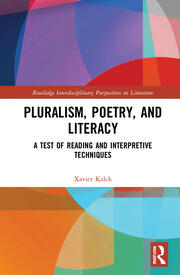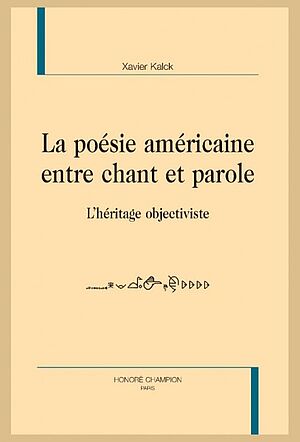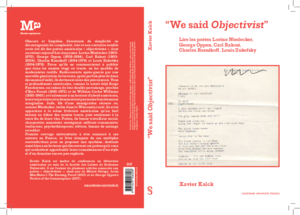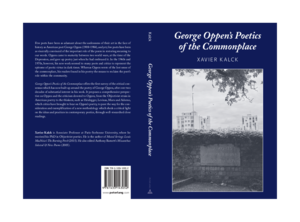Xavier Kalck
- FACULTE DES LANGUES, CULTURE ET SOCIETES
Présentation
Dernières actualités
(2021) Pluralism, Poetry and Literacy: A Test of Reading and Interpretive Techniques. New York: Routledge.

BOOK DESCRIPTION
Drawing from Medieval and Renaissance studies, analytic philosophy and pragmatism, Jewish studies, as well as ecocriticism and environmental humanities, this book demonstrates the consistent relationship between pluralism and literacy through the prism of poetry by confronting the history of interpretive practices with examples from American poets Robert Lax, Larry Eigner, Louis Zukofsky, Gary Snyder and Theodore Enslin. Divided into four areas of investigation—the meditative, the analytic, the diasporic and the ecological reader—it is an invitation to turn to premodern reading practices related to spiritual exercises as well as modern reading practices devoted to the critical pursuit of analytical knowledge. This study further reflects on the textual models of Jewish diaspora as another form of dialog between sacred and secular interpretive practices, before examining a final variation on this distinction by looking at the separation between contemplative and investigative perspectives on reading and writing nature.
REVIEWS & INFORMATION:
(2020) La poésie américaine entre chant et parole : l’héritage objectiviste. Paris : Honoré Champion.

À la façon d’une enquête, ce livre se propose de faire découvrir au public français les chemins que prend le poème américain au XXe siècle, depuis les « motz el son » des troubadours qu’invoquait Ezra Pound, pour trouver un équilibre précaire, de la guerre du Vietnam jusqu’au 11 septembre 2001, entre chant et parole. De Larry Eigner à John Taggart, en passant par Robert Creeley, Robert Duncan, Denise Levertov, Jerome Rothenberg et Armand Schwerner, mais aussi Michael Heller, Theodore Enslin ou Robert Lax, sans oublier Cid Corman, David Ignatow, Harvey Shapiro, ou encore Hugh Seidman, on y parcourt un formidable archipel d’œuvres singulières, dont le point commun se révèle être leur rapport à l’héritage « objectiviste », incarnation du modernisme à partir duquel ils se situent.
https://www.honorechampion.com/fr/11290-book-08535356-9782745353566.html
(2019) “We Said Objectivist.” Lire les poètes Lorine Niedecker, George Oppen, Carl Rakosi, Charles Reznikoff, Louis Zukofsky. Paris : Sorbonne Université Presses.

Obscurs et limpides, déroutants de simplicité ou décourageants de complexité, tout et son contraire semble avoir été dit des poètes américains « objectivistes », dont on retient aujourd’hui cinq noms, Lorine Niedecker (1903- 1970), George Oppen (1908-1984), Carl Rakosi (1903-2004), Charles Reznikoff (1894-1976) et Louis Zukofsky (1904-1978). Parce qu’ils ne commencèrent à publier que dans les années vingt ou trente, on les qualifia de modernistes tardifs. Redécouverts après-guerre par une nouvelle génération de lecteurs, après parfois plus de deux décennies d’oubli, ils devinrent alors des précurseurs. Tous si profondément ancrés dans une nouvelle tradition nationale, comme le notait déjà Serge Fauchereau, en raison notamment de leur double parrainage, proches d'Ezra Pound comme de William Carlos Williams, et s'adressant à un lectorat d'abord américain, leurs trajectoires n'en demeurèrent pas moins foncièrement marginales. Juifs, fils d'une immigration récente, ou comme Niedecker, isolée dans le Wisconsin rural, ils n'ont appartenu à la scène littéraire qu'un bref instant au début des années trente, puis seulement à la toute fin de leurs vies. Poètes, ils furent travailleur social, charpentier, menuisier, enseignant, militant communiste, traducteur, psychothérapeute, éditeur, femme de ménage ou soldat. Riche de nombreuses analyses détaillées, cet ouvrage se veut une introduction raisonnée aux conflits et aux contextes spécifiques qui marquèrent les œuvres de ces auteurs, ainsi qu'aux enjeux de poétique contemporaine qui en découlent.
(2017) George Oppen’s Poetics of the Commonplace. New York: Peter Lang.

Few poets have been as adamant about the uselessness of their art in the face of history as American poet George Oppen (1908–1984), and yet, few poets have been as viscerally convinced of the important role of the poem in restoring meaning to our words. Oppen came to maturity between two world wars, at the time of the Depression, and gave up poetry just when he had embraced it. In the 1960s and 1970s, however, his new work seemed to many poets and critics to represent the epitome of poetic virtue in dark times. Whereas Oppen wrote of the lost sense of the commonplace, his readers found in his poetry the means to reclaim the poet’s role within the community.
George Oppen’s Poetics of the Commonplace offers the first survey of the critical consensus which has now built up around the poetry of George Oppen, after over two decades of substantial interest in his work. It proposes a comprehensive perspective on Oppen and the criticism devoted to Oppen, from the Objectivist strain in American poetry to the thinkers, such as Heidegger, Levinas, Marx and Adorno, which critics have brought to bear on Oppen’s poetry, to pave the way for the consideration and exemplification of a new methodology which sheds a critical light on the ideas and practices in contemporary poetics, through well-researched close readings.



